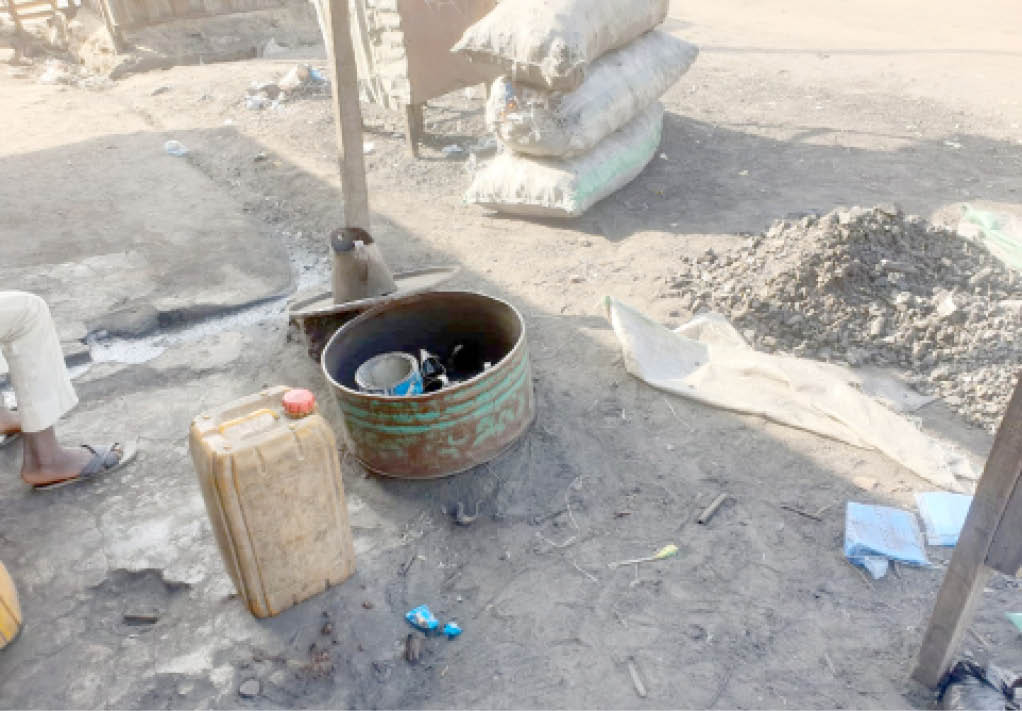At different times, tragedies resulting from adulterated kerosene explosion have been recorded in diverse proportions. Several lives and property worth millions of naira have been lost to the catastrophes. Investigations by our correspondents have shown that adulteration of the product with petrol by sellers who are bent on making brazen profits as well as the use of the household product by unsuspecting users are responsible for the disasters. Daily Trust Saturday highlights different scenarios of such tragedies so far witnessed in some parts of the country.
Borno records tragedies at UNIMAID
- Govt commences sale of 600 bags of fertilizer
- A Typical Nigerian Week: Tomori’s Tears, Travel Apartheid and Sokoto’s corpses
In Borno State, adulterated kerosene tragedies have occurred at various times. Daily Trust Satuday gathered that a female student recently died after an explosion from adulterated kerosene at the University of Maiduguri (UNIMAID).
Six blasts, we gathered, reportedly occurred at the female hostels while students were cooking on their stoves. There were also unreported cases at the male hostels.
The university authorities confirmed that the fires were caused by kerosene explosion. They have, however, yet to announce the report of an independent inquiry on the occurence.
A female student at Aisha Buhari Hall where one of the incidents happened who preferred anonymity said students though the management had later banned cooking in the hostels as adulterated kerosene is still in circulation.
“Normal kerosene has a peculiar smell. It is also colourless, but the one in question has unpleasant odour and does not burn fast. When the blast occurred, the flame spread quickly and engulfed the rooms. Two students were severely injured in one explosion and admitted to the University of Maiduguri Teaching Hospital (UMTH) and one later died,” she said.
She added that the management had banned use of cooking gas to prevent fire incident, which compelled students to resort to use of kerosene.
Shortly after the first incident, the Director, Radio and Public Relations, Professor Danjuma Gambo, said kerosene explosions caused the fire outbreak and that investigations had commenced to prevent future incidents.
The Dean of Students, Professor A M Gimba, issued a statement after the second incident in which he said management had directed hostel officers to expel any student found cooking in the hostel.
Yakubu Musa is a petrol supplier. He said consumers were to blame for kerosene explosions because they mix the commodity with diesel which makes it difficult to burn fast.
“Another major problem is that, tankers supplying petrol to filling stations are not allowed to carry kerosene after discharging the product. But most of the times, tanker handlers do not abide by laid down procedures.”

Kerosene business plummets in Kano
In Kano, our correspondent gathered that though adulterated kerosene explosion is minimal, some users had been lamenting that some incidents had been attributed to it and responsible for loss of property.
Hajiya Hajara Abdullahi who is yet to recover from an injury she sustained from kerosene suspected to be adulterated, told our reporter how the incident almost made her lose her hairs to the inferno.
“Some months ago before we stopped using kerosene, I entered the kitchen to warm water. Immediately I lit my kerosene stove with matches, the fire exploded and caught my hair and some parts of my face,” she said.
“I don’t know whether it was adulterated but my husband suspected it to be. As you can see, it left some wounds on my face,” the victim said.
Findings by our correspondent also indicated that in Kano, kerosene business is diminishing as a result of other alternatives that are faster in cooking and cheaper in price, especially due to gas and charcoal despite that their prices are also high.
Many of the sellers in the metropolis are now into other businesses, especially gas and charcoal sales, since only very few people buy kerosene due to fear of adulteration and explosion.
A kerosene dealer in Dorayi Quarters, Rabiu Lawan, said he had closed his shop since last year due to increase in the price of the product and drop in sales.
“Two or three years ago, I used to sell about two or three tanks of kerosene. I had three shops merged together, with over 10 people working for me. But due to changes in the situation and the coming of charcoal and gas, patronage fell drastically. In fact, there was a time I hardly sold one or two drums in a week. I have customers everywhere in Kano. Some of them are in Sabongari Market, while some are in residential areas. But now, I only sell gallons in one of my shops at home.”
Malam Dalladi, a local kerosene seller in Kurna area of Kano metropolis, said he had never encountered any adulterated kerosene challenge since 10 years that he spent in the business.
He, however, said his worry now was kerosene continued to lose patronage due to other alternatives.
He said he had resorted to selling charcoal since his customers now predominantly use it for cooking.
“You see, kerosene business is dying every day and people are resorting to other alternatives like charcoal and cooking gas,” he said.
“Most fuel stations no longer sell kerosene to locals like us. So, we have to buy from dealers who sell beyond considerable prices. That’s why a gallon of kerosene is about N2,000.”
A father of seven, Usaini Sulaiman, said even though his wife prefers cooking gas or charcoal, he still buys kerosene for other purposes despite that the price appears unaffordable.
He added that the hike in the price of charcoal and cooking gas might likely force people back to kerosene if it became cheaper.
“Last time when I went to buy cooking gas, the price was high and people are lamenting. I think we may go back to kerosene even though the price is still very high. Honestly, no where is easy for us,” he said.
Explosion kills two, injures four in Enugu
In Enugu State, the people of Mgboko, Amabokwu, Obie villages in Aku, Igbo-Etiti Local Area were recently thrown into mourning as adulterated kerosene exploded in households, killing two and injuring four others.
Several reports claimed that kerosene vendors in the area adulterated the product with petrol, leading to explosions in homes where the product was used.
Daily Trust Saturday gathered that one of the victims, a headmaster, Mr John Nnadi, of Obie Aku, and his mother, Mrs Aneja Nnadi, lost their lives.

Other victims who sustained various degrees of injury were identified as Mrs Josephine Ugwueke, Ms Blessing Ugwueke, Mrs Nkechi Aka and one Mrs Chinenyenwa who had been taken to hospitals for treatment.
A source said that a two-year-old child was also reported to have been badly injured.
The President General of Aku General Assembly, Prof. Godwin Mba, who confirmed the incident, said relevant authorities had been contacted to ensure that those selling adulterated kerosene in the community were arrested and face prosecution.
Prof Mba said: “I have informed all the necessary bodies that are concerned about arresting the culprits, confiscating the remaining unsold kerosene in every depot identified as the source of the adulterated kerosene and visiting the affected families.”
The National Public Relations Officer of Aku Welfare Association Federated, Ikenna Amadi, condemned the incident which he described as “callous and dastardly.”
The association, in a statement, advised residents of the community to stop the use of kerosene till further notice.
The statement partly read: “All filling stations and sellers of kerosene operating in Aku and its environs should stop the sale of kerosene until further notice. All persons and residents in Aku should identify and possibly evacuate all liquid in the nature of kerosene within their reach or homes to nearby bushes, forests or any other safe place. AWAF will take steps to dig into the root of the matter and ensure that the culprits face the music.”
Meanwhile, the Enugu State Government also condemned sale of adulterated kerosene in communities in the state and directed the Department of Petroleum Resources as well as other relevant agencies to investigate and fish out those dealing in the harmful product.
A statement by the Commissioner for Information, Chidi Aroh, directed the Commissioner for Health, Dr Ikechukwu Obi, and the ministry’s Permanent Secretary, Dr Ifeanyi Agujiobi, to ensure that those injured were treated free of charge.
“The chairmen of the affected local government areas have equally been directed to carry out a detailed appraisal of the situation as it concerns their respective council areas and report back to the state government for further action,” he had said.
Low patronage for kerosene in Benue
In April, 2020, adulterated kerosene tragedy occurred at Ogbagji in Agatu Local Government Area of Benue State, following an accident involving a kerosene tanker between 3am and 4am. But no casualty was recorded. It was only the tanker and a few buildings, including a flat and high tension wires within the vicinity of the fire disaster that got burnt.
The Sector Commander of Federal Road Safety Corps (FRSC) in the state, Yakubu Mohammad, confirmed that the buildings were burnt during the explosion.
A resident, Benedicta Akorchia, told our correspondent that a woman who was trying to use kerosene to lit her charcoal stove, suffered burns on her leg recently when it exploded on the leg.
Our correspondent, however, gathered that kerosene explosion is no more rampant in the state because consumers have shifted preference for stove to either cooking gas or charcoal. Akorchia also told our correspondent that people now relied more on charcoal for cooking because apart from the danger of adulterated kerosene, its prices as well as gas’ had skyrocketed in recent times.
“Many people no longer rely on kerosene for cooking. They prefer charcoal or cooking gas. Also, incidences of kerosene explosion are no longer common,” she said.
Another resident, Onyeje Arome, said the use of kerosene has reduced significantly since the prices went up. “Personally, I haven’t heard of kerosene explosion in Benue. Since the prices of kerosene went up, you can hardly find the product at filling stations, talk less of from roadside hawkers.”
Our correspondent who went round Makurdi metropolis, could not find kerosene at most filling stations.
Sellers and attendants said they ran out of the product just as there are no traces of black market hawkers selling the product.
The Director of the state Fire Service, Donald Ikyaaza, said while there could be possibilities of such domestic accidents, no cases of kerosene explosion had ever been reported to his office.
The Benue State Police Command, DSP Catherine Anene, said: “We have had cases of accident involving tankers that sometimes explode. I am not so sure if those products were kerosene.”
In Ilorin too
There is low incidence of explosion in Ilorin, the Kwara State capital. A local seller of the product in Lajorin area fondly called Alhaja, said though there had been reported cases of adulterated kerosene explosion, she had not experienced such incident.
Alhaja who also sells charcoal, said patronage and sales of the product had dropped in recent time despite rise in the prices of cooking gas and electricity. She added that people usually complained of increase in the price of other cooking alternatives. “A small bottle of kerosene that used to be sold for N50 is now N150.”
Expert speaks on how to avoid explosion
A local marketer and manager of Neemam Oil, Murtala Mohammed Way, Ilorin, Sulyman Edun, advised against substituting kerosene kegs for PMS. He called for proper draining of kegs before using them for another product.
Edun said that kerosene could not explode on its own except it was mixed with other products like PMS.
He added that the low explosion incident rate in Ilorin could be attributed to proper checks from the deport as well as by marketers.
“The natural colour of kerosene is like water which is colourless. But when it is mixed with diesel, it turns a bit brownish. Unlike PMS (petrol) which is cold, kerosene is warm. The most important thing is for those in the depot as well as major marketers to ensure they drain their storage tanks and trucks properly before they use it to load other products.
“It would be better if we could dedicate particular tanks for different products such as kerosene, petrol and diesel,” he added.
Clement Adeyi (Abuja), Hope Abah Emmanuel (Makurdi), Mumini AbdulKareem (Ilorin), Zahraddeen Yakubu Shuaibu (Kano), Misbahu Bashir (Maiduguri) &Tony Adibe (Enugu)

 Join Daily Trust WhatsApp Community For Quick Access To News and Happenings Around You.
Join Daily Trust WhatsApp Community For Quick Access To News and Happenings Around You.


